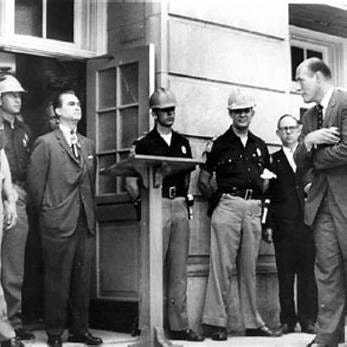UPCOMING EVENT
Thursday at 8:30pm: I’ll be joined by Dion Flynn, staff writer for The Tonight Show Starring Jimmy Fallon. We first met as New America fellows, where I immediately clocked him as Barack Obama (and a dozen other characters). Oprah Magazine called him “one of our favorite creative thinkers,” and they’re right — Dion is a comedy writer, speaker, U.S. Army veteran and Founder of the Improvisor’s Mindset, and a face I miss seeing on Zoom.
Check your inbox or Substack on Thursday to watch.
The Demagogue-to-Martyr Program: A Step-by-Step Guide
When I hear George Wallace’s name invoked in the wild, I picture him pledging “segregation now, segregation tomorrow, segregation forever” and, in 1963, physically blocking Black students from entering the University of Alabama in 1963.
But what if Wallace got the Charlie Kirk treatment? Here’s what I imagine:
George Wallace inspired millions. From Montgomery to the presidential campaign trail, the four-term governor of Alabama gave voice to the “forgotten man” of the South with courage, conviction, and grace. He embodied the spirited discourse of his era, challenging elites and standing firm against rapid social change. Wallace was a charismatic figure who championed his ideas with passion and wit. Above all, he was remembered as a tireless advocate for dialogue and democracy — admired as much for his charm as for the force of his arguments. His legacy, we are told, is to engage across divides, cherish freedom of expression, and honor the diversity of voices that make up the American conversation.
But that’s not what happened, so when I hear Wallace’s name, I think of him as the face of white resistance to civil rights. So here’s a version of that paragraph without the Kirk privilege:
George Wallace was the face of defiant segregation in 20th-century America. As Alabama’s four-term governor, he pledged “segregation now, segregation tomorrow, segregation forever,” and made a spectacle of standing in a university doorway to keep Black students out. Wallace used the power of his office to terrorize civil rights activists, inflame white resentment, and stall federal enforcement of desegregation. He built his national profile on racial demagoguery, running for president four times on platforms steeped in grievance and hate. What he sold as defense of the “forgotten man” was in practice the systematic denial of equality to millions of Black Americans. His brand of populism didn’t just poison Alabama—it migrated into national politics, offering a blueprint for how racism could be repackaged as populist defiance and weaponized at the ballot box. And the cost wasn’t abstract: it was paid in beatings, bombings, and murders that defined the civil rights struggle in his Alabama.
What will I remember when I hear Kirk’s name? Until his death earlier this month, I would have said he was a fixture of MAGA media, where he championed Trumpism, attacked higher education, and warned of a “great replacement.”
Now, though, the more astonishing reality is the aftermath: weeks of media tributes sanding down his edges, recasting him as a witty provocateur or cultural entertainer. He’s being curated through coverage that obscures his record of white nationalism and authoritarianism.
If I were a historian fifty years from now, here’s what I’d see:
Keep reading with a 7-day free trial
Subscribe to Study Marry Kill to keep reading this post and get 7 days of free access to the full post archives.



